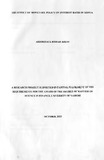| dc.contributor.author | Aress, Abdirizack B | |
| dc.date.accessioned | 2013-03-15T11:10:06Z | |
| dc.date.issued | 2012 | |
| dc.identifier.citation | Masters in Business Administration | en |
| dc.identifier.uri | http://erepository.uonbi.ac.ke:8080/xmlui/handle/123456789/14087 | |
| dc.description.abstract | There is general agreement among economists and policymakers that monetary policy
works mainly through interest rates. When the central bank policy is tightened through a
decrease in reserve provision, for instance, interest rates rise. Interest rates reflect the
interaction between the supply of savings and the demand for capital; or between the
demand for and the supply of money. This study set to establish the effect of monetary
policy on interest rates. In doing this, the study set to answer the question: how does the
monetary policy relate to interest rates in Kenya?
The study adopted a quantitative comparative design. The target population for this study
included 44 banking institutions (43 commercial banks and 1 mortgage finance company
- MFC), transacting business in Kenya as at December 2011. Because consolidated data
on the variables of the study was available at the Central bank of Kenya, the study
conducted a census by including all the members of the population. The study used
secondary data from the Central bank of Kenya. Data was obtained from the CBK
covering the period between 31st January 2001 and 31st December 2011. The study
focused on three major monetary policy instruments including: Central bank rate, 91-Day
Treasury bill rate, and REPO rate. The researcher conducted a multiple regression
analysis in order to determine the effect of monetary policy on interest rates in the Kenya.
The study concluded that lending rates in Kenya were affected by various factors key
among them being the 91 Day Treasury bill Rate which had the highest impact among the
three variables studied in this study. The repo rate determines the rate at which the
financial institutions can borrow from one another to meet their short term shortfalls and
came in second in affecting the lending rates in Kenya. The Central Bank Monetary
policy Committee uses the central bank rate to check on the Macroeconomic changes in
the economy. It uses it to check the inflation among other variables in the economy hence
affecting the lending rates. | en |
| dc.description.sponsorship | The University of Nairobi | en |
| dc.language.iso | en | en |
| dc.subject | Monetary policy | en |
| dc.title | The effect of monetary policy on interest rates in Kenya | en |
| dc.type | Thesis | en |
| local.publisher | School of Business | en |

